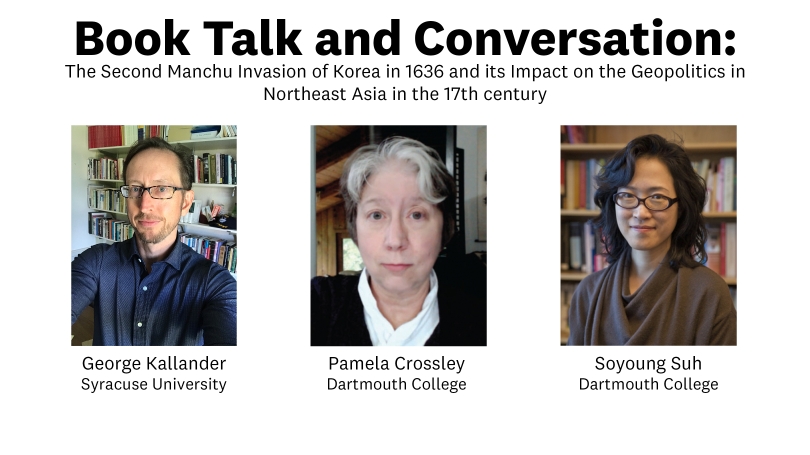
- Undergraduate
- Research
- Foreign Study
- Inclusivity
- News & Events
- People
Back to Top Nav
Back to Top Nav
Book Talk and Conversation: The Second Manchu Invasion of Korea in 1636 and its Impact on the Geopolitics in Northeast Asia in the 17th century
George Kallander (History, Maxwell School of Syracuse University)
Discussants: Pamela Crossley (History, Dartmouth College), Soyoung Suh (History, Dartmouth College)
Date: Thursday, May 5, 2022
Time: 7 p.m. – 8:15 p.m.
Please register at https://dartgo.org/1636manchuinvasionofkorea
George Kallander is Professor of History and Director of Graduate Studies in the History Department at Syracuse University, where he is also Director of the East Asia Program at the Moynihan Institute. He is author of The Diary of 1636: The Second Manchu Invasion of Korea (Columbia University Press, 2020) and Salvation through Dissent: Tonghak Heterodoxy and Early Modern Korea (University of Hawai'i Press, 2013). His third book Human-Animal Relations and the Hunt in Early Modern Korea and Northeast Asia (Edinburgh University Press, 2023) will be published in a new series titled Encounters in the Middle East and Asia. He is also co-editor of the Cambridge History of Korea project, the Chosŏn Dynasty volume, for which he is contributing a chapter. Kallander has received fellowships from the Institute for Advanced Study (Princeton), the Academy of Korean Studies, and Columbia University.
About the Book:
Early in the 17th century, Northeast Asian politics hung in a delicate balance among the Chosŏn dynasty in Korea, the Ming in China, and the Manchu. When a Chosŏn faction realigned Korea with the Ming, the Manchu attacked in 1627 and again a decade later, shattering the Chosŏn-Ming alliance and forcing Korea to support the newly founded Qing dynasty.
The Korean scholar-official Na Man'gap (1592–1642) recorded the second Manchu invasion in his Diary of 1636, the only first-person account chronicling the dramatic Korean resistance to the attack. Partly composed as a narrative of quotidian events during the siege of Namhan Mountain Fortress, where Na sought refuge with the king and other officials, the diary recounts Korean opposition to Manchu and Mongol forces and the eventual surrender.
Na describes military campaigns along the northern and western regions of the country, the capture of the royal family, and the Manchu treatment of prisoners, offering insights into debates about Confucian loyalty and the conduct of women that took place in the war's aftermath. His work sheds light on such issues as Confucian statecraft, military decision making, and ethnic interpretations of identity in the seventeenth century.
Translated from literary Chinese into English for the first time, the diary illuminates a traumatic moment for early modern Korean politics and society. Professor George Kallander's critical introduction and extensive annotations place "The Diary of 1636" in its historical, political, and military context, highlighting the importance of this text for students and scholars of Chinese and East Asian as well as Korean history.